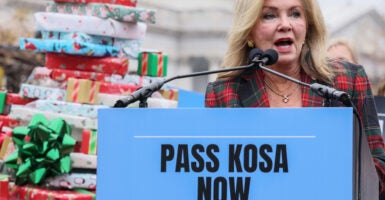Big Tech is terrified that unfettered access to our children is close to an end. And when industry business models thrive on luring minors, they have every reason to be paranoid of the Kids Online Safety Act.
That bill has been one of the most clamored-for pieces of legislation in the 118th Congress. Designed as a set of nonintrusive social networking protections for children, it has garnered the support of more than 240 organizations, a supermajority of the Senate, more than 30 state attorneys general, and, most recently, free speech champions Elon Musk and Donald Trump Jr.
As its list of allies grows, its provisions were sharpened to prevent government overreach and platform censorship, as well as to bolster parental tools and consent. The most recent changes were led by X, whose full endorsement speaks volumes for the integrity of these guardrails, because it would be one of the largest platforms under its authority.
The following is a rundown of the most notable changes in the latest draft.
While the bill always had a Rules of Construction stating that nothing in the Duty of Care provision shall be construed to require a covered platform to prevent a minor from searching for content or accessing information regarding the prevention of harms, skeptics remained wary of potential implications on free speech.
They will be hard-pressed to argue that case now that the revised version added a provision forbidding government entities from enforcing the Duty of Care “based upon the viewpoint of users expressed by or through any speech, expression, or information protected by the First Amendment to the Constitution of the United States.”
Users and platforms alike should be pleased with its inclusion. The government’s proclivity to work hand-in-glove with Big Tech to censor COVID-19 content alarmed many when President Joe Biden’s press secretary famously said the White House was “in regular touch with social media platforms” regarding “misinformation.”
Another First Amendment concern raised by some critics of the bill is that the Kids Online Safety Act would incentivize platforms to overcomply and mark conservative content as anxiety or depression-inducing. The bill’s authors addressed that by clarifying that platforms were to create design features that prevent depressive and anxiety disorders when such conditions are related to compulsive usage and the design feature—not the content—is a contributing factor.
Just because a platform provides a means to convey speech, does not mean everything a company does is protected by the First Amendment.
Take for example, design features like infinite scrolling, auto play, push alerts, and personalized recommendation systems. These features do not affect what a user may or may not post, but rather, they focus on keeping a user engaged and even addicted to the platform. In other words, they directly relate to compulsive usage.
The revised Kids Online Safety Act draft incorporated many changes from the version that passed committee in the House, including no longer ceding authority to the controversial Diagnostic and Statistical Manual of Mental Health Disorders, eliminating the government study on social media harms, and tightening the size and scope of the Kids Online Safety Council with appointments to be selected by members from both chambers, both parties, and the administration.
The updated text expressly forbids platforms from conducting market or product-focused research on users it knows are children under 13. Remember, the platforms are not supposed to allow kids under 13 to have accounts, according to their terms of service and to comply with the Children’s Online Privacy Protection Act of 1998.
The revised Kids Online Safety Act requires platforms to obtain verifiable parental consent for research for kids older than 13. This robust measure provides parents with greater autonomy over how Big Tech companies may or may not use their children’s information.
It’s been 26 years since the United States has passed a law protecting children online. Since then, virtually every American has witnessed an epidemic of child exploitation and social media addiction among our youths, leading to adverse mental health outcomes, self-harm, and worse.
Big Tech shoulders a significant portion of the blame. The Kids Online Safety Act is an opportunity to change that trajectory.































